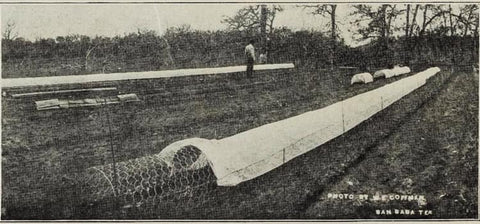
Many know and love the flavor of Texas pecans, but not everyone knows the history of how the many varieties of flavorful pecans grown here were discovered. Imagine exploring such a vast state in search of meaty, high producing, wild pecan trees in the late 1800s. They were surprisingly few. In fact, many find it difficult to believe that a single San Saba Pecan tree is at the heart of such a wide-reaching industry.
The Mother Pecan Tree Meets the Father of the Industry
 Not so certain that the majority of the delicious pecans you enjoy today are a result of one tree? Believe it! You see, what many do not realize is that the pecan is a tree that does not duplicate itself through seedlings. E.E. Risien, the man that saved the thin-shelled San Saba Mother Pecan tree, didn’t realize it either. Not at first, anyway.
Not so certain that the majority of the delicious pecans you enjoy today are a result of one tree? Believe it! You see, what many do not realize is that the pecan is a tree that does not duplicate itself through seedlings. E.E. Risien, the man that saved the thin-shelled San Saba Mother Pecan tree, didn’t realize it either. Not at first, anyway.
Risien had quite an affinity for pecans. In fact, he enjoyed the natural delicacies so much that he organized a pecan show – believed to be the very first – in hopes that he would find a superior specimen of pecan. Well, he did. Unfortunately, when Risien asked if he could see the tree the pecans came from, the winning exhibitor brought him to a tree that had been sawed down into practically nothing. Only a single branch of the tree remained! The exhibitor had sawed off all of the other branches in order to harvest the nuts.
The History Behind the San Saba Pecan
Eventually, Risien purchased the land that the prize producing pecan tree was on and, over time, it regrew its crown. It also began producing its thin-shelled fruits again. This likely fueled Risien’s dream. He wanted a whole orchard of these trees. Because of this, he tried desperately to replicate the tree that produced those delicious pecans he had fallen in love with. After decades of work and more than 1000 pecan nuts that failed to produce trees bearing the same fruit, he finally figured out that budding and grafting could provide the prized pecans he dreamed his orchard would hold.
Today, the tree is known as a San Saba Pecan. Risien named it appropriately after the county and town it was grown in and the river that hydrated its roots. This “Mother Tree” went on to help create several popular varieties, including the San Saba Improved, Squirrel’s Delight, and Western Schley. Of course, countless more varieties were developed from this tree as well. And Risien? Well, he did develop that dream orchard he had always intended. In fact, he became the father of the pecan industry and the reason that San Saba is now known as “The Pecan Capital of the World”.
How Old Is the San Saba Pecan?
Although the true age of the San Saba Pecan is unknown, it is clear that groves of mature pecan trees existed in the San Saba region as far back as the mid-1700s, which is when Coronado and other explorers came upon them. Of course, the early settlers did not look at the pecan in the same way as the Native Americans. It was not originally thought of as a source of food or revenue. Because of this, these trees were not important. In fact, it is believed that thousands of pecan trees were cut down by early settlers to make way for farm land and fields for grazing cattle.
Once people began to realize just how good pecans were and how many different recipes they could be used in, these trees became more popular. Harvesting the nuts was often done by lopping off entire branches. This harvesting method was responsible for the discovery of pecan wood as a viable option for flooring and furniture making. Of course, this resulted in even more of the trees being cut down. It wasn’t until Risien established his orchard and embarked upon a mission to make these nuts known worldwide that the tree became more respected and the pecan industry was truly born.
With such a rich history behind it, the San Saba is the pecan that sets the bar for all other pecans. This historic tree has paved the way for a wide array of varieties and inspired countless recipes that will be prepared for generations.

